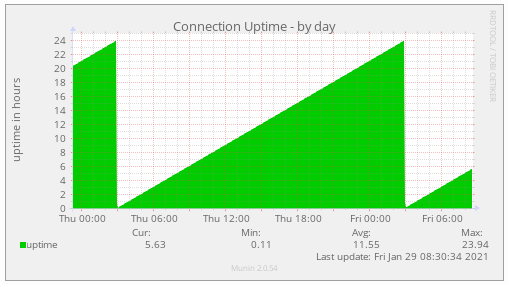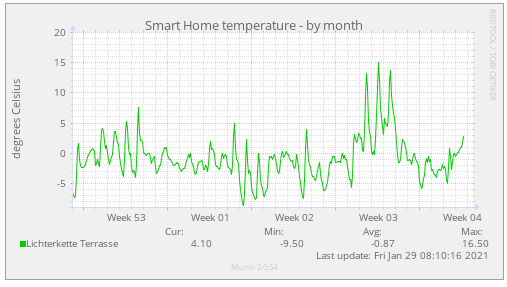A collection of Munin plugins to monitor your AVM FRITZ!Box router.
The values are retrieved via the fritzconnection project.
So far the following FRITZ!Box models have been confirmed working:
- FritzBox 7590 with FRITZ!OS Version 7.28 to 7.57
- FritzBox 7530 AX with FRITZ!OS Version 7.80 to 7.81
If you are using the scripts on a different FRITZ!Box model please let me know by
- opening an issue
- submitting a pull request
These scripts are build upon the original fritzbox-munin with the goal to make use of the more modern APIs that FRITZ!OS 7 provides.
The main differences to the original version are:
- Compatibility with latest FRITZ!OS version using username/password authentication
- No HTML scraping
- All data is fetched either through the TR-064 interface or the JSON API
- Contrary to the original version this fork uses multigraphs: this removes the need to query the same API endpoint multiple times, all multigraph plugins have configuration options to switch individual graphs on and off
- Support for Smart Home devices, e.g. for measuring temperature
- Complete refactoring of the Python code base to make it more robust, use modern language features like type hinting, tests and remove code duplication
- Added possibility to connect to FRITZ!Box via TLS
- Added automated testing via GitHub Actions
- FRITZ!Box router with FRITZ!OS >= 7.50 (if you are on an older FRITZ!OS version, select an older version of fritzbox-munin-fast by browsing the tags in this repository)
- Munin 1.4.0 or later is required
- Python >= 3.9
Plugin: fritzbox_connection_uptime.py
Shows the WAN connection uptime.

Plugin: fritzbox_dsl.py
Multigraph plugin, showing:
- DSL checksum errors
- DSL transmission errors
- line loss
- link capacity
- error correction statistics
- signal-to-noise ratio
Plugin: fritzbox_ecostat.py
Multigraph plugin, showing:
- memory usage
- CPU load
- CPU temperature
Plugin: fritzbox_smart_home.py
Multigraph plugin, showing:
- temperature sensors
- switch states
- power values
- energy consumption values
Plugin: fritzbox_energy.py
Multigraph plugin, showing:
- power consumption for CPU, WiFi, WAN, Fon, USB and total
- devices connected on WiFi and LAN
- system uptime
Plugin: fritzbox_link_saturation.py
Multigraph plugin, showing saturation of WAN uplink and downlink by QoS priority
Plugin: fritzbox_traffic.py
Similar to fritzbox_link_saturation, but single-graph and without QoS monitoring.
Plugin: fritzbox_wifi_load.py
Multigraph plugin, showing for 2.4GHz and 5GHz
- WiFi uplink and downlink bandwidth usage
- neighbor APs on same and on different channels
-
To install requirements run
pip install -r requirements.txt -
Make sure the FRITZ!Box has UPnP status information enabled. (web interface: Home Network → Network → Network Settings → Universal Plug & Play (UPnP))
-
Copy all the scripts from the published release to
/usr/share/munin/plugins -
(optional) If you want to connect to FRITZ!Box using SSL, download the Fritz certificate (web interface: Internet → Freigaben → FritzBox Dienste → Zertifikat → Zertifikat herunterladen) and save it to
/etc/munin/box.cer. The certificate might change after a FRITZ!Box Update. -
Create entry in
/etc/munin/plugin-conf.d/munin-node:[fritzbox_*] env.fritzbox_user <fritzbox_user> env.fritzbox_password <fritzbox_password> env.fritzbox_use_tls true host_name fritzboxSee the plugin files for plugin-specific configuration options.
-
For each plugin you want to activate, create a symbolic link to
/etc/munin/pluginsand make it executable, e.g.:ln -s fritzbox_dsl.py /etc/munin/plugins/fritzbox_dsl.py && chmod +x /etc/munin/plugins/fritzbox_dsl.py -
Restart the munin-node daemon:
service munin-node restart. -
Done. You should now start to see the charts on the Munin pages🥳
The fritzbox_energy.py script depends on the language selected in your FRITZ!Box. Currently, two locales are
supported:
- German:
de(default) - English:
en
You can change the used locale by setting an environment variable in your plugin configuration:
env.locale en
You can split the graphs of your FRITZ!Box from the localhost graphs by following the next steps:
-
Use the following as your host configuration in
/etc/munin/munin.conf[home.yourhost.net;server] address 127.0.0.1 use_node_name yes [home.yourhost.net;fritzbox] address 127.0.0.1 use_node_name no -
Restart your munin-node:
service munin-node restart
To manually test a plugin use
munin-run --pidebug fritzbox_connection_uptime.py
Run all unit tests with
pytest --cov
